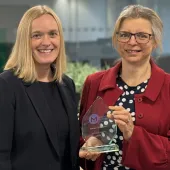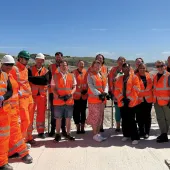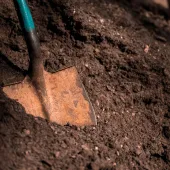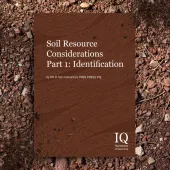E-learning Takes Off At Derby

Update on the online Diploma project
The University of Derby has now been teaching the diplomas in Quarry Technology and Asphalt Technology, originally known as the DAPS (Doncaster Assisted Private Study) courses, for the past three years. One of the main reasons for moving to the university was to take advantage of its experience in the field of E-learning, so that the courses could be delivered to students through the medium of the Internet, rather than by conventional distance learning methods.
When the courses left Doncaster College, the intellectual property rights in the quarrying teaching material were acquired by the Institute of Quarrying (IQ), while the asphalt material rights were transferred to the Institute of Asphalt Technology (IAT). The IQ also acquired the rights to the Concrete Technology course material, allowing this be added to its portfolio of interests.
The two Institutes then entered into a partnership agreement with the University of Derby (UoD) over the operation of the courses, with IQ taking responsibility for developing the quarry-specific teaching material and IAT looking after asphalt.
Rapid progress
Early in 2008, IQ set up a pilot project to convert three typical units (subject booklets) for online delivery. The aims of the trial were not only to develop an understanding of the new technology, but also to ascertain the degree of complexity appropriate for each subject area and the benefits which might accrue to the students.
To this end, it was decided to develop the three units at three different levels of interactivity, allowing both timescales and costs to be measured relative to the level of complexity. It was envisaged that once the pilot project had been completed, sufficient experience would have been gained to ensure that the remaining 200 teaching units could be completed over a three-year period.
A key feature of this development has been the willingness of the university to allow staff in its internal Educational Development Centre to support the project. This has provided access to a wide range of pedagogical (the science of learning) specialists familiar with E-learning development work.
For its part, IQ released former general manager Mike Smith to work full-time on the project, a role since taken over by Julian Smallshaw, a former quarry operations manager with over 20 years’ experience in the industry. The combination of two sets of complementary skills, together with a great deal of enthusiasm, has resulted in rapid progress with the first complete module (22 out of IQ’s 66 units) being made available online during February 2009.
A key objective from the outset was to enrich the learning experience by making available to students a wide range of resources other than the printed word, black and white photographs and line drawings. Accordingly, a host of interactive graphics and video clips have been commissioned through the university or secured from major suppliers to the industry, many of whom have generously provided copious amounts of information and materials designed to help students understand how equipment and processes work.
This unusual level of co-operation between industry and academia over the Derby E-learning project even reached the attention of a CBI team looking at innovative examples of workforce development through employer/higher education partnerships. This resulted in the IQ/IAT/UoD partnership being included in the CBI’s ‘Stepping Higher’ report together with 12 other class-leading examples of industry and academia working together. Among the other projects recognized were partnerships run by Associated Newspapers and Cranfield Business School; Rolls Royce and the University of Bristol/West of England; Network Rail and Sheffield Hallam University; and Sir Robert McAlpine and Warwick Business School. The IQ and IAT were the only professional institutes involved.
The IQ has now been able to set a new time frame for its part of the diploma course conversion, with completion scheduled for the end of June 2009, some 18 months ahead of schedule.
Superior learning experience
The end result of the process is that E-learning allows the student to view high-quality images, colour photographs, animations, videos, voice-overs etc –– providing a learning experience that is far superior to the former black and white photocopies. In addition, self-assessment questions are not only fully interactive and much more challenging, but the teaching units can now be easily updated to include the latest products and practices.
A further advantage is that, by giving students access to this step forward in learning development, lecturers are better able to make use of their valuable resources, while for the student, the learning experience, which is often undertaken at the end of a long working day, becomes more intuitive and less arduous. Thus, in future students will find it easier to absorb the course information and, hence, achieve better results. And finally, the large volumes of printed paperwork (literally hundreds of pages) which have characterized the distance learning process until now will become part of history.
Although very successful to date, the current position with the Diploma
E-learning project is viewed as being only the first example of the mineral products industry’s ability to make use of this progressive and user-friendly learning environment. Further challenges are already being identified and developments will be reported in due course.








